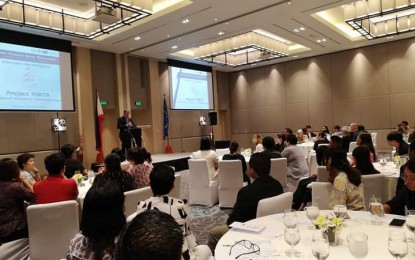
SERVING THE LESS PRIVILEGED. Project Forth Coordinator Robert Wagenaar speaks during the opening of the second transnational training of trainers meeting held in a hotel in Iloilo City on Monday (Feb. 17, 2020). The country, with the support of the European Union, is going to craft a curriculum for the Master Program of teachers assigned in challenged areas. (PNA photo by Perla G. Lena)
ILOILO CITY -- An enrichment program designed for teachers in challenged areas in the Philippines will be crafted in the country co-funded by the Erasmus+Programme of the European Union.
The five-day second transnational training of trainers meeting for the Project FORTH (Formation of Teachers in Challenged Areas in the Philippines) is currently ongoing in a hotel in Iloilo City that will run until February 21.
“Basically, the goal of this project is to create a Masters Program to prepare and equip teachers who are going to teach in challenged areas,” said Dennis O. Dumrique, Associate Dean of the College of Education of the Polytechnic University of the Philippines (PUP) in an interview on the sidelines during the opening program on Monday.
Challenged areas, he said, are those socially and economically challenged places. He said working in those areas is “not a piece of cake”. There are a lot of challenges to include among others the type of learners and accessibility.
“We want at the end of the day to make learners functional in society. That they could learn and acquire skills needed in the modern world,” he said.
The project is developed in partnership with the PUP Manila, Centro Escolar University Manila, University of Southeastern Philippines (USeP) Davao, West Visayas State University (WVSU) Iloilo and University of St. La Salle (USLS) Bacolod and other government and private institutions.
The new curriculum will be a Major on Teaching in Emerging Challenged Areas. It will be incorporated with foundation/core courses, electives and research requirements of the Master of Arts in Education following the curriculum of the school where the program is being offered.
The major will have six modules, which will total to one-year credits out of the two-year Master Program.
“One of the goals of this program is when we launch it, we will have like scholars, the first set of teachers who will benefit from this program,” he added.
Meanwhile, Dr. Joselito Villaruz, president of the WVSU, said the program is “very timely and relevant”.
“Institutions of higher learning, universities need to constantly respond to the needs of communities, most especially the underserved, the geographically disadvantaged, the least, the last and the lost,” he said.
He said that the project will serve as “impetus” in response to the call of the government for help in building resilient communities and achieve sustainable development goals.
Robert Wagenaar, project coordinator and FORTH director of the International Tuning Academy, said the initiatives are one of the favorites of the European Union because it “exactly fits their agenda” which is part of the sustainability goals.
“It starts with young people, they must have a future, a better future,” he said.
He added that what is happening here will serve as “example for other parts of the world”.
The Philippines was chosen as a pilot area due to its large number of children and youth, the country’s positive attitude towards learning, the quality of many of its teacher education programs and the use of English as the medium for instruction. (PNA)
